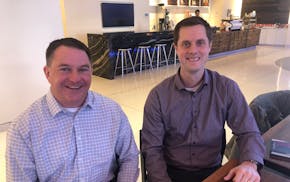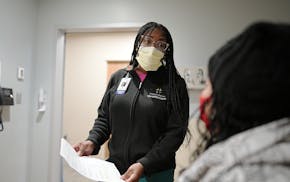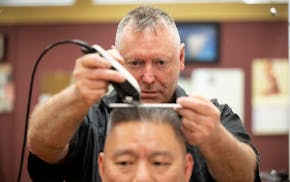Steele Lorenz and Sri Latha Ganti, University of Minnesota graduates who partnered in an environmental entrepreneurship seminar in 2010, are deepening the commercial roots of their fledgling company in rural India.
They developed a mobile-phone application that already helps hundreds of small farmers in an arid part of southern India double their fruit-and-vegetable yields while slashing their use of water and fertilizer.
Now, Lorenz and Ganti have raised up to $500,000 in expansion capital for their three-year-old MyRain company,
"We were right," Lorenz said last week during a visit to the Twin Cities. "It wasn't just a good idea. It's a growth business. A social venture. Our growth, profit and social goals are intertwined."
MyRain this fall was one of 17 businesses chosen for funding from among 520 applicants in 90 countries that are focused on improving water-and-food security by the U.S. Agency for International Development; Sida, Sweden's development agency; and the Ministry of Foreign Affairs of the Netherlands.
The funding will help MyRain over the next three years improve the yields and lives of up to 1 million "small-plot" farmers, who work less than an acre up to five acres. Already, the MyRain system has shown positive results for several hundred farmers on about 1,000 acres.
MyRain's mobile application is something of a virtual wholesaler that links tiny local retailers, who sell the components of small drip irrigation systems to the farmers. The application helps the retailers do a simple survey for each farmer. The variables include the area of the plot, water requirements, pressure at the head of the irrigation system, as well as an estimated bill for the cost of the materials.
Huge investment
The completed system costs $200 to $500, a huge investment for tiny subsistence farmers, who sell most of their crops and eat the rest.
"That's why the design is so important," Lorenz said. "They have the money for a good investment, but not any mistakes.
"Combining cost estimate and design capabilities into a mobile app enabled us to quickly turn small agricultural retailers into irrigation experts and allows us to distribute irrigation equipment in completely unserved areas of India," Lorenz said. "Drip irrigation can increase water efficiency by 20-to-50 percent, while increasing yields by up to 100 percent. There are 41 million small-holding farmers in India who could benefit from this technology. I knew MyRain could get irrigation equipment into the hands of small-plot farmers at scale and have substantial impact on water security."
MyRain focuses in the province of Tamil Nadu, where about 75 million people live in the arid southern tip of India. Traditionally, farmers used "flood" irrigation, from cisterns that are filled during the monsoon season. That is imprecise, can wash out fertilizer and even crops. Farmers often exhaust their water stocks too early.
The MyRain system pays for itself in "12 to 18 months, two to three growing seasons," Lorenz said.
Because drip irrigation uses less water, most of the small farmers are able to expand their planting and increase the number of crops they plant while also cutting fertilizer bills. Fertilizer, too, is distributed precisely to plants through the irrigation systems and no longer washed away.
"It's incredibly rewarding to see retailers and the farmers increase productivity and profitability through our system," Lorenz said.
Co-founders Lorenz and Ganti, however, have yet to make big bucks. Lorenz, who quit a business consulting job to start MyRain in 2011 with $35,000 in investor capital, has started to pay himself a modest salary out of growing revenue.
Ganti has volunteered her expertise here and in India. And last week, she resigned from her job as a process-implementation engineer at Seagate to join MyRain full-time.
"We have proved the business model and the technology is our proven advantage," Ganti said last week. "We are building a capable, compassionate team to improve our processes, serve the market and take it to the next level.
"It's a for-profit venture that can benefit a lot of customers through a relationship with us. The retailers who distribute the product are our local champions and our primary customers. The farmers are the end customers. It's a huge market and it's a huge impact from a personal standpoint. The farm families really benefit from this technology."
MyRain has a team of 30 in India, working in technology, sales, marketing, warehouse and administration.
Lorenz, the son of a college professor from Green Bay, Wis., is a 2010 graduate of the university's Carlson School of Management. Ganti, a 2011 graduate of the university's College of Science and Engineering who grew up in India, met Lorenz when they participated in the Acara social entrepreneurship program at the university's Institute on the Environment.
"We worked very well together and we've put together a global team that can work around the clock to get things done," Ganti said.
Fred Rose, co-director of the Acara program, said: "I'm happy they are doing this and pleasantly surprised they are doing so well.
"Steele and Sri are exceptional young people. There was a consensus in the room when we reviewed their business model that we were not sure it would work. But there also was a belief that Steele and Sri could make it work."
Neal St. Anthony • 612-673-7144 • neal.st.anthony@startribune.com

St. Anthony: 'Patient' investing paying off for St. Paul's Hill Capital

Jennifer Smith, leader of Burnsville's Innovative Office Solutions, has died

St. Anthony: Medical professions in Minnesota need more people of color in their ranks



